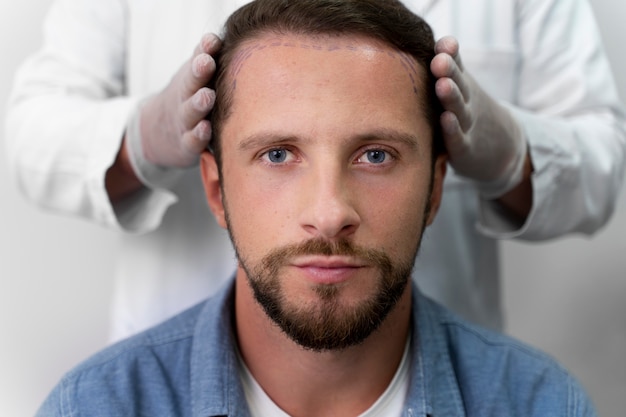
Have you noticed more hair falling out than usual? Hair loss expert Dr. Omar is here to explain five major causes of hair loss and offer a solution that actually works.
Hair is a big part of our identity, giving us character and confidence. However, about 8 million women in the UK experience some form of hair loss or thinning. If you’re dealing with this but haven’t talked about it, you’re not alone. Nearly half of women with hair loss feel too insecure or embarrassed to discuss it.
We typically lose between 100 to 150 strands of hair daily, which is completely normal. The hair follicles go through three stages in the Hair Growth Cycle, including a shedding stage.
People often think hair loss can’t be treated and buy supplements that don’t work. But don’t worry, there are effective solutions. First, you need to understand the hair growth cycle:
1. Growth Phase (Anagen): 85-90% of hair is growing in this phase, lasting 3-5 years.
2. Transition Phase (Catagen): Hair stops growing and detaches from the follicle. Only 1% of hair is in this phase at any time, lasting 1-2 weeks.
3. Resting Phase (Telogen): 10-15% of hair stays inactive for 3-4 months before shedding.
If you’re losing more hair than usual or it seems like it’s not growing back, it might be time to worry. Hair loss (alopecia) can start suddenly or gradually and affect the scalp to different degrees. Signs include a disrupted Hair Growth Cycle, leading to shorter growth phases and extended resting phases.
Many triggers can cause hair loss, and identifying the exact reason can be tricky. Here are five common causes:
1. Hereditary Hair Loss: Known as male or female-pattern hair loss, it’s the most common cause. Genetics can cause hair to thin gradually as you age.
2. Hormonal Imbalances: Both men and women need testosterone, but an imbalance can cause hair loss. For women, especially post-menopausal, hormone changes can lead to thinning hair.
3. Stress: High stress levels can cause hair loss by raising cortisol, the stress hormone, which impacts the hair growth cycle.
4. Medications: Some medications for conditions like cancer, high blood pressure, and depression can cause hair loss by interfering with the hair follicles.
5. Pregnancy: While pregnancy often makes hair thicker due to increased hormones, some women experience thinning, especially after childbirth.
To combat hair loss, Dr. Omar suggests looking into Proteoglycan Replacement Therapy. Nourkrin, a supplement using Marilex (a fish extract), is rich in proteoglycans essential for hair growth. Clinical research shows positive outcomes with participants reporting significant improvement in hair growth and quality.
If you’re concerned about hair loss, it might be time to consult a doctor or explore treatments like Nourkrin. Balancing your Hair Growth Cycle is key, and taking these steps can help restore your hair’s health.




